401004 Professional Practice: Reflection on Medication Administration
VerifiedAdded on 2023/06/07
|5
|825
|164
Journal and Reflective Writing
AI Summary
This reflective journal documents a nursing student's experiences and lessons learned during medication administration, utilizing the Gibbs Reflective Cycle. The reflection covers three scenarios: a personal error in administering oral medication to a baby, a fellow student's successful subcutaneous injection, and another student's incorrect intramuscular injection technique. The student analyzes the emotional impact of these events, evaluates the positive and negative aspects, and concludes with an action plan for future professional development, emphasizing patient safety and adherence to medical procedures. The reflection underscores the importance of continuous learning and skill improvement in nursing practice.
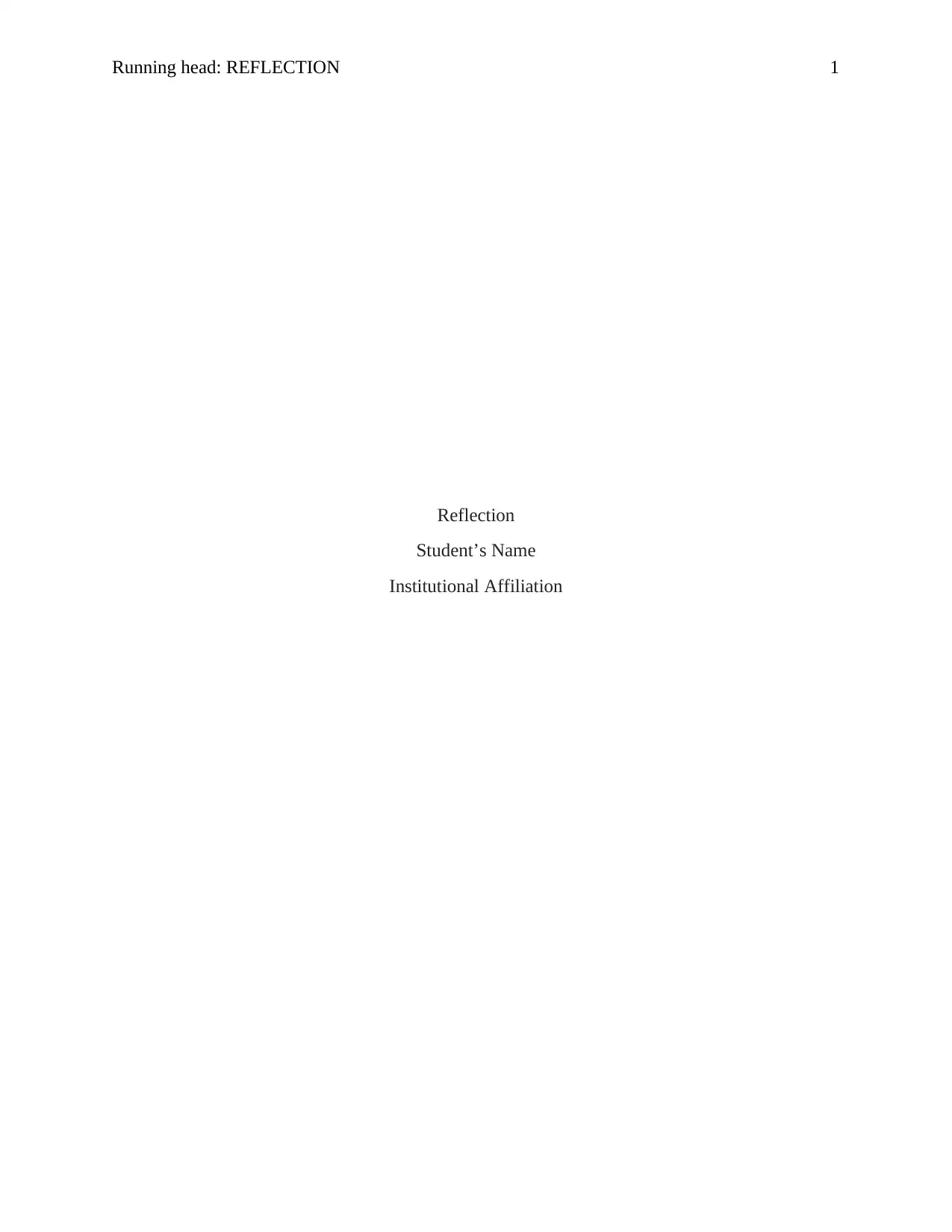
Running head: REFLECTION 1
Reflection
Student’s Name
Institutional Affiliation
Reflection
Student’s Name
Institutional Affiliation
Paraphrase This Document
Need a fresh take? Get an instant paraphrase of this document with our AI Paraphraser
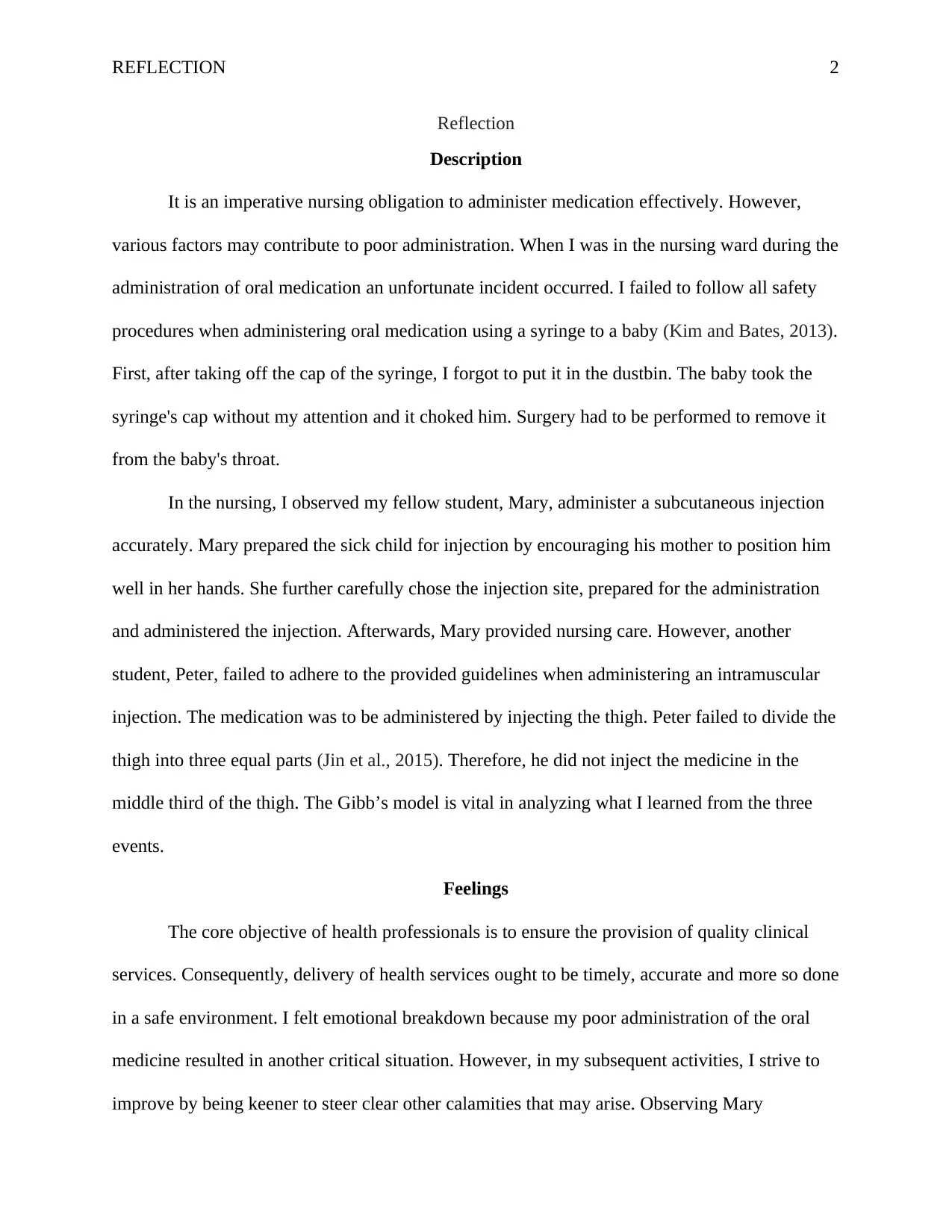
REFLECTION 2
Reflection
Description
It is an imperative nursing obligation to administer medication effectively. However,
various factors may contribute to poor administration. When I was in the nursing ward during the
administration of oral medication an unfortunate incident occurred. I failed to follow all safety
procedures when administering oral medication using a syringe to a baby (Kim and Bates, 2013).
First, after taking off the cap of the syringe, I forgot to put it in the dustbin. The baby took the
syringe's cap without my attention and it choked him. Surgery had to be performed to remove it
from the baby's throat.
In the nursing, I observed my fellow student, Mary, administer a subcutaneous injection
accurately. Mary prepared the sick child for injection by encouraging his mother to position him
well in her hands. She further carefully chose the injection site, prepared for the administration
and administered the injection. Afterwards, Mary provided nursing care. However, another
student, Peter, failed to adhere to the provided guidelines when administering an intramuscular
injection. The medication was to be administered by injecting the thigh. Peter failed to divide the
thigh into three equal parts (Jin et al., 2015). Therefore, he did not inject the medicine in the
middle third of the thigh. The Gibb’s model is vital in analyzing what I learned from the three
events.
Feelings
The core objective of health professionals is to ensure the provision of quality clinical
services. Consequently, delivery of health services ought to be timely, accurate and more so done
in a safe environment. I felt emotional breakdown because my poor administration of the oral
medicine resulted in another critical situation. However, in my subsequent activities, I strive to
improve by being keener to steer clear other calamities that may arise. Observing Mary
Reflection
Description
It is an imperative nursing obligation to administer medication effectively. However,
various factors may contribute to poor administration. When I was in the nursing ward during the
administration of oral medication an unfortunate incident occurred. I failed to follow all safety
procedures when administering oral medication using a syringe to a baby (Kim and Bates, 2013).
First, after taking off the cap of the syringe, I forgot to put it in the dustbin. The baby took the
syringe's cap without my attention and it choked him. Surgery had to be performed to remove it
from the baby's throat.
In the nursing, I observed my fellow student, Mary, administer a subcutaneous injection
accurately. Mary prepared the sick child for injection by encouraging his mother to position him
well in her hands. She further carefully chose the injection site, prepared for the administration
and administered the injection. Afterwards, Mary provided nursing care. However, another
student, Peter, failed to adhere to the provided guidelines when administering an intramuscular
injection. The medication was to be administered by injecting the thigh. Peter failed to divide the
thigh into three equal parts (Jin et al., 2015). Therefore, he did not inject the medicine in the
middle third of the thigh. The Gibb’s model is vital in analyzing what I learned from the three
events.
Feelings
The core objective of health professionals is to ensure the provision of quality clinical
services. Consequently, delivery of health services ought to be timely, accurate and more so done
in a safe environment. I felt emotional breakdown because my poor administration of the oral
medicine resulted in another critical situation. However, in my subsequent activities, I strive to
improve by being keener to steer clear other calamities that may arise. Observing Mary
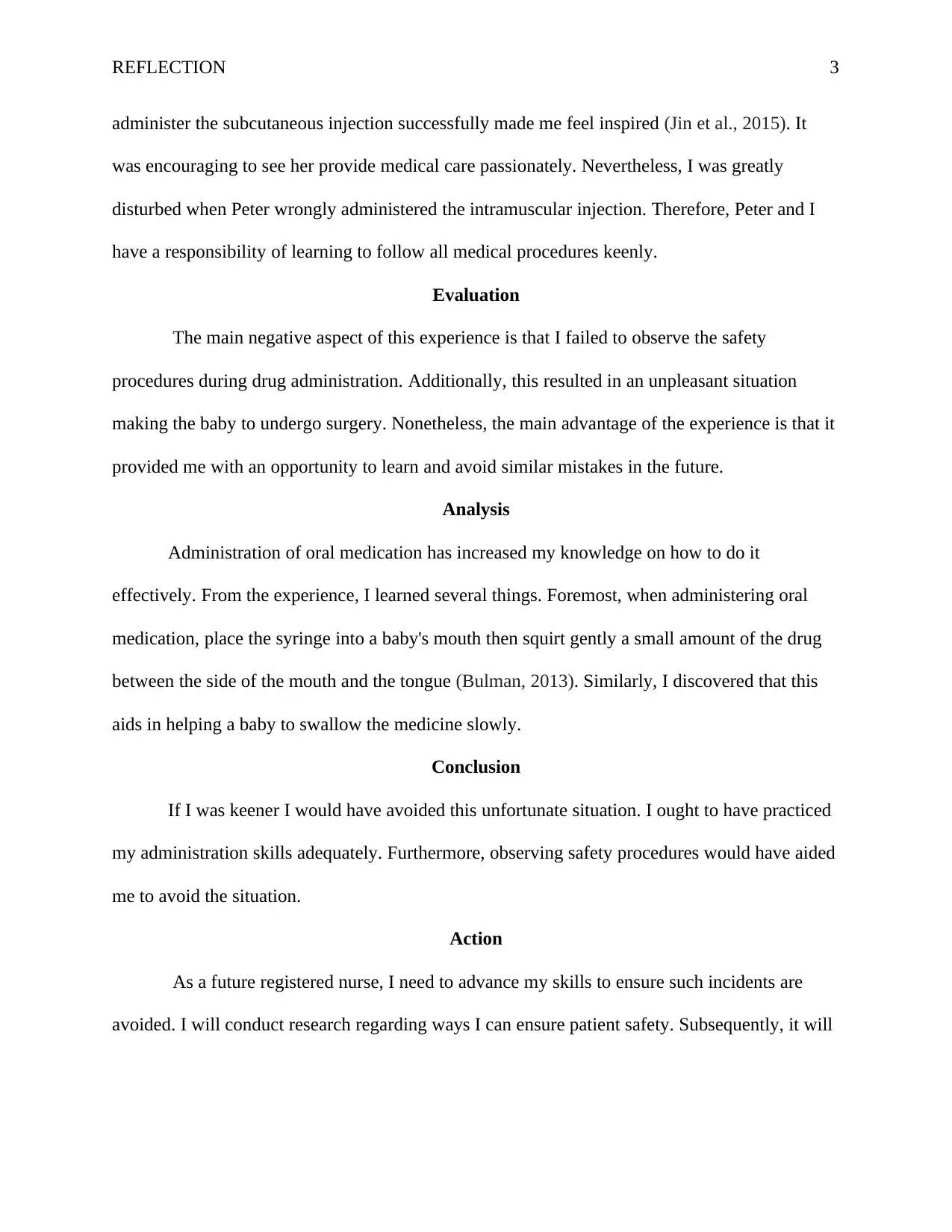
REFLECTION 3
administer the subcutaneous injection successfully made me feel inspired (Jin et al., 2015). It
was encouraging to see her provide medical care passionately. Nevertheless, I was greatly
disturbed when Peter wrongly administered the intramuscular injection. Therefore, Peter and I
have a responsibility of learning to follow all medical procedures keenly.
Evaluation
The main negative aspect of this experience is that I failed to observe the safety
procedures during drug administration. Additionally, this resulted in an unpleasant situation
making the baby to undergo surgery. Nonetheless, the main advantage of the experience is that it
provided me with an opportunity to learn and avoid similar mistakes in the future.
Analysis
Administration of oral medication has increased my knowledge on how to do it
effectively. From the experience, I learned several things. Foremost, when administering oral
medication, place the syringe into a baby's mouth then squirt gently a small amount of the drug
between the side of the mouth and the tongue (Bulman, 2013). Similarly, I discovered that this
aids in helping a baby to swallow the medicine slowly.
Conclusion
If I was keener I would have avoided this unfortunate situation. I ought to have practiced
my administration skills adequately. Furthermore, observing safety procedures would have aided
me to avoid the situation.
Action
As a future registered nurse, I need to advance my skills to ensure such incidents are
avoided. I will conduct research regarding ways I can ensure patient safety. Subsequently, it will
administer the subcutaneous injection successfully made me feel inspired (Jin et al., 2015). It
was encouraging to see her provide medical care passionately. Nevertheless, I was greatly
disturbed when Peter wrongly administered the intramuscular injection. Therefore, Peter and I
have a responsibility of learning to follow all medical procedures keenly.
Evaluation
The main negative aspect of this experience is that I failed to observe the safety
procedures during drug administration. Additionally, this resulted in an unpleasant situation
making the baby to undergo surgery. Nonetheless, the main advantage of the experience is that it
provided me with an opportunity to learn and avoid similar mistakes in the future.
Analysis
Administration of oral medication has increased my knowledge on how to do it
effectively. From the experience, I learned several things. Foremost, when administering oral
medication, place the syringe into a baby's mouth then squirt gently a small amount of the drug
between the side of the mouth and the tongue (Bulman, 2013). Similarly, I discovered that this
aids in helping a baby to swallow the medicine slowly.
Conclusion
If I was keener I would have avoided this unfortunate situation. I ought to have practiced
my administration skills adequately. Furthermore, observing safety procedures would have aided
me to avoid the situation.
Action
As a future registered nurse, I need to advance my skills to ensure such incidents are
avoided. I will conduct research regarding ways I can ensure patient safety. Subsequently, it will
⊘ This is a preview!⊘
Do you want full access?
Subscribe today to unlock all pages.

Trusted by 1+ million students worldwide
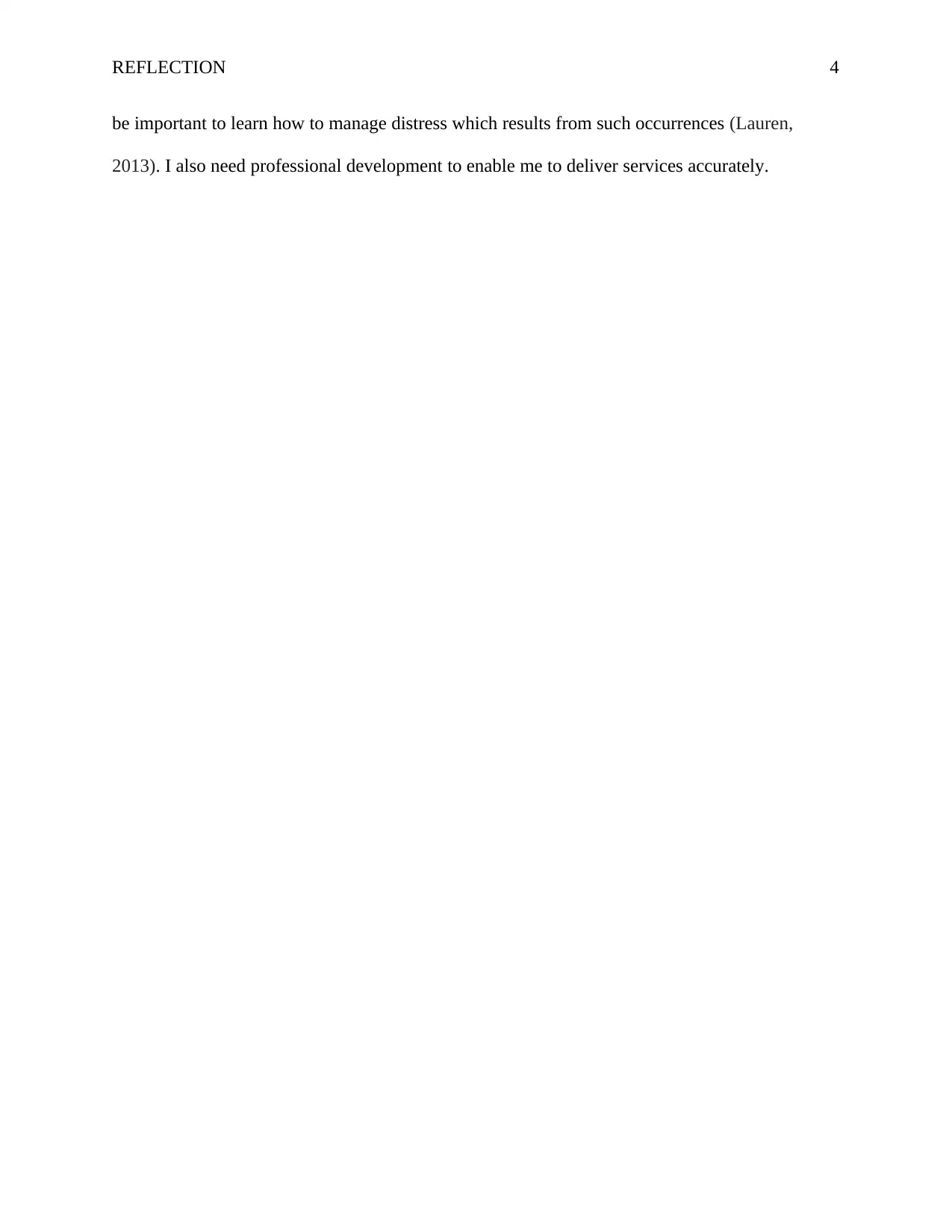
REFLECTION 4
be important to learn how to manage distress which results from such occurrences (Lauren,
2013). I also need professional development to enable me to deliver services accurately.
be important to learn how to manage distress which results from such occurrences (Lauren,
2013). I also need professional development to enable me to deliver services accurately.
Paraphrase This Document
Need a fresh take? Get an instant paraphrase of this document with our AI Paraphraser
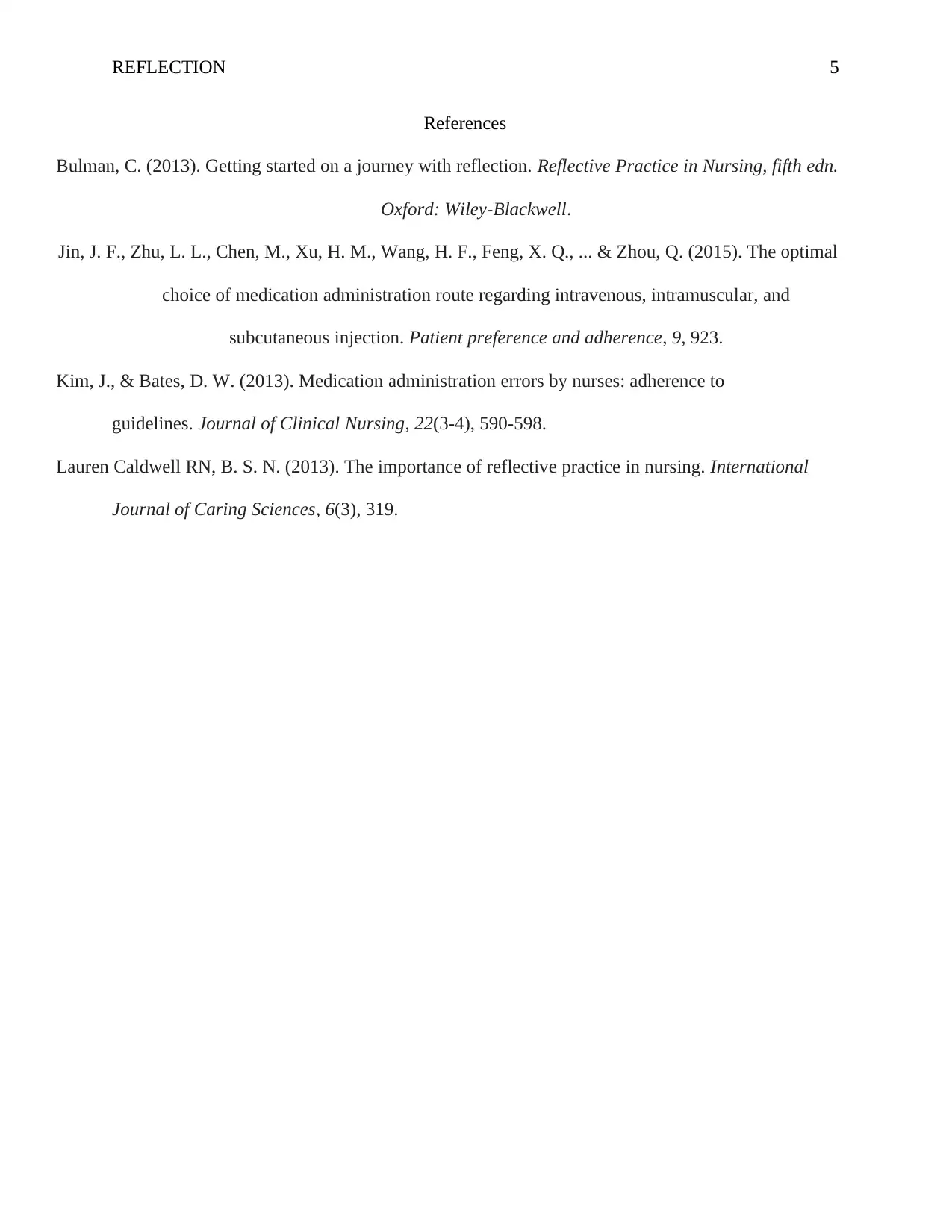
REFLECTION 5
References
Bulman, C. (2013). Getting started on a journey with reflection. Reflective Practice in Nursing, fifth edn.
Oxford: Wiley-Blackwell.
Jin, J. F., Zhu, L. L., Chen, M., Xu, H. M., Wang, H. F., Feng, X. Q., ... & Zhou, Q. (2015). The optimal
choice of medication administration route regarding intravenous, intramuscular, and
subcutaneous injection. Patient preference and adherence, 9, 923.
Kim, J., & Bates, D. W. (2013). Medication administration errors by nurses: adherence to
guidelines. Journal of Clinical Nursing, 22(3-4), 590-598.
Lauren Caldwell RN, B. S. N. (2013). The importance of reflective practice in nursing. International
Journal of Caring Sciences, 6(3), 319.
References
Bulman, C. (2013). Getting started on a journey with reflection. Reflective Practice in Nursing, fifth edn.
Oxford: Wiley-Blackwell.
Jin, J. F., Zhu, L. L., Chen, M., Xu, H. M., Wang, H. F., Feng, X. Q., ... & Zhou, Q. (2015). The optimal
choice of medication administration route regarding intravenous, intramuscular, and
subcutaneous injection. Patient preference and adherence, 9, 923.
Kim, J., & Bates, D. W. (2013). Medication administration errors by nurses: adherence to
guidelines. Journal of Clinical Nursing, 22(3-4), 590-598.
Lauren Caldwell RN, B. S. N. (2013). The importance of reflective practice in nursing. International
Journal of Caring Sciences, 6(3), 319.
1 out of 5
Related Documents
Your All-in-One AI-Powered Toolkit for Academic Success.
+13062052269
info@desklib.com
Available 24*7 on WhatsApp / Email
![[object Object]](/_next/static/media/star-bottom.7253800d.svg)
Unlock your academic potential
Copyright © 2020–2026 A2Z Services. All Rights Reserved. Developed and managed by ZUCOL.





